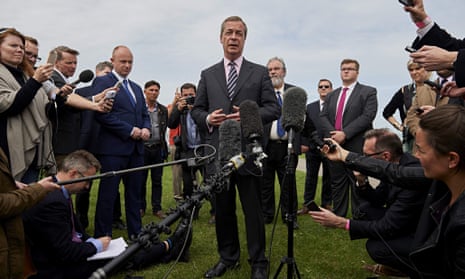Britain’s’s first-past-the-post voting system has been declared broken and unfit for an era of multiparty politics as analysis of general election figures showed that it had delivered the least proportional result in the country’s history.
Data compiled by the Electoral Reform Society (ERS) for the Observer showed Ukip had received 3.86m votes for the one MP it had elected to the Commons. This compared with an average of 26,000 votes for every SNP MP, 34,000 for every Conservative, 40,000 for every Labour MP and 299,000 for every Liberal Democrat.
The ERS said that 24.2% of seats in parliament were now held by MPs who would not be there if a proportional voting system were in place. The previous record highest figure was 23% in 1983, when the former SDP suffered from first-past-the-post. In 2010 the figure was 21.8%.
Although the system delivered a majority for the Conservatives, against all expectations, the ERS said the data demonstrated more clearly than ever that the system was skewed against certain parties and biased in favour of others.
Its analysis showed that, of almost 31 million people who voted, 19 million (63% of the total) did so for losing candidates. Out of 650 winning candidates, 322 (49%) won less than 50% of the vote.
Katie Ghose, chief executive of the ERS, said: “This election is the nail in the coffin for our voting system. First past the post was designed for a time when nearly everyone voted for one of the two biggest parties. But people have changed and our system cannot cope.”
On Friday, after Nigel Farage had failed to win in Thanet South and seen his party secure just one seat, while piling up second and third places across the country, the Ukip leader described first-past-the-post as “bankrupt”.
Ghose added: “The Conservatives have won a majority in parliament on not much more than a third of the vote. So while the prospect of a hung parliament has receded, the problems with our voting system have remained in the foreground.
“It cannot be right that it takes 26,000 votes to elect an MP from one party and almost four million to elect an MP from another. Millions will have woken up on Friday morning to find their voices effectively haven’t been heard. At a time when more and more people are turning away from politics, our broken voting system is making it worse.
“Another blight on our democracy is the existence of safe seats. More than half of us live in constituencies where the result was a foregone conclusion. A fairer, more proportional system would eradicate safe seats once and for all.
“The SNP seem dominant in Scotland, winning 56 of 59 seats. You’d be forgiven for thinking that nearly everyone voted for the SNP in Scotland. In reality, only half did.
“One of the features of our broken voting system is that it accentuates divides. For instance, those who vote Conservative in Scotland have gone almost unrepresented, as have Labour voters in rural southern constituencies or Conservative voters in northern urban seats. The UK is at a constitutional crossroads, so the last thing we need is a voting system that pits nations and regions against each other.
“As we face an uncertain constitutional future, it is vital that we consider proportional representation as a means of easing some of the pressures that have built up. And of course PR has the added bonus of accurately translating votes into seats in parliament. That would be a huge improvement on the lottery-like results we saw on Friday.”











Comments (…)
Sign in or create your Guardian account to join the discussion